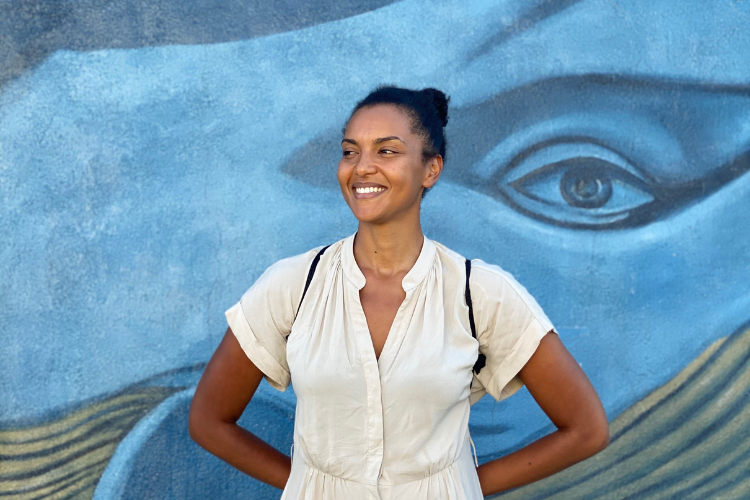
Beyond Exodus: A Psalm for Juneteenth
My Juneteenth began this year in late May when my friend Megan hit me up saying, “Wait hold on… So literally I just learned that the entire Passover story is a lie. We need to talk about this.”
It took a few weeks to actually talk about it. I believed Megan, but held off on my own search.
“Is it true that Jews weren’t slaves in Egypt?” I thought aloud. “How did I miss this in all of my years at Hebrew School and Passover tables?” Evidently, this fundamental truth of my Jewish identity may not be historically true. I searched, I clicked, I read. I even asked a rabbi, “Hey, what’s up with this thing about Jews not being slaves?” I received no conclusive answers–apparently, scholars continue to debate the historical accuracy of this biblical text.
If we were not enslaved in Egypt, what does this mean for us as a people? (speaking as an American Jew here).
What does this mean for how white Jews have aligned themselves with Black people who were enslaved in the United States? (speaking as a Black American here).
I was managing my Jewish existential crisis fairly well when I read an email from a Jewish organization asking me to write a Psalm for Juneteenth, the holiday celebrating the emancipation of Black Americans from slavery. Clearly I had some things to consider.
Passover is the most obvious material to reference in writing a new Psalm that speaks to the emancipation of Black people from slavery. But what does this mean for the kinship that Jews have often created with Blacks through the slavery narrative? In writing the psalm, I did not want to rely on the story of Exodus to be the bridge that connects us. Without this biblical bridge, how should white Jews celebrate this part of the Black experience without making it about themselves? (A question which we’re answering in real time).
I am a Black American, and a descendant of the Kingdom of Eswatini where my father is from. Therefore, I am not a direct descendant of American slavery. However (and this is equally important), I have inherited Black American history and inhabit my own Black history, present, and future. I am Black and I’m proud….I’m Black y’all.
Still, I felt a higher standard of specificity was important around this history of Juneteenth, particularly while using those royal and congregational “we’s.”
As I imagine (the way I do as an artist), what freedom meant in 1865 in Galveston, while simultaneously reflecting on what it means to me today, I invite you to celebrate the freedom, brilliance, and resilience of Black people. And I invite you to celebrate and participate in the dismantling of white supremacy today and everyday.
A Psalm for Juneteenth
Be’chol Lashon’s Liturgy: Juneteenth 2021
Clap your hands, all you nations
Shout to God with cries of joy
Black is Queen!
Black is King!
Black is Free!
Black is Free.
Why is this day different from all other days?
On this day the message of freedom was no longer delayed
Galveston, Texas 1865, and Today
May I carry the message of freedom
May I receive the message of freedom
May I stretch my arms wide, breathing deeply
May a gust of wind blow boundless through my mind
May I remember forgotten dreams
May tears escape from my eyes and evaporate skillfully on my cheek
May joyful shouts escape from my mouth as freely as birds fly into pink sky over salty water
May I lull myself and others into a peaceful sway by singing:
Oh Beautiful, Willow Weep For Me, The Sweetest Sound, Go Tell It On The Mountain of This Little Light of Mine…
May our teeth shine as we smile at one another
May we cook, may we potluck together, giving thanks to the God in each of us
On this day we eat soul food, infused with the spirit of freedom
On this day we relax in the spirit of freedom
On this day we dance in the spirit of freedom
On this day we laugh in the spirit of freedom
On this day we tell the story in the spirit of freedom, we spread the news!
And as we clasp hands, all you nations
Our palms transmit an inner whisper
No words of false equivalency are shared
Only the inner language of God
Heard in silence:
Freedom.
Rebecca S’manga Frank is a Black American Jew descendant from the Kingdom of Eswatini and Eastern Europe. She is a writer, actor, director, educator and filmmaker. Recently her work has been featured at the Jewish Theological Seminary, Society Theatre, JCC Manhattan, JCC Global, LABA New York (2021 Fellow), Elm Shakespeare Company, with Reboot for DAWN, and other artistic, religious, and/or cultural institutions.



